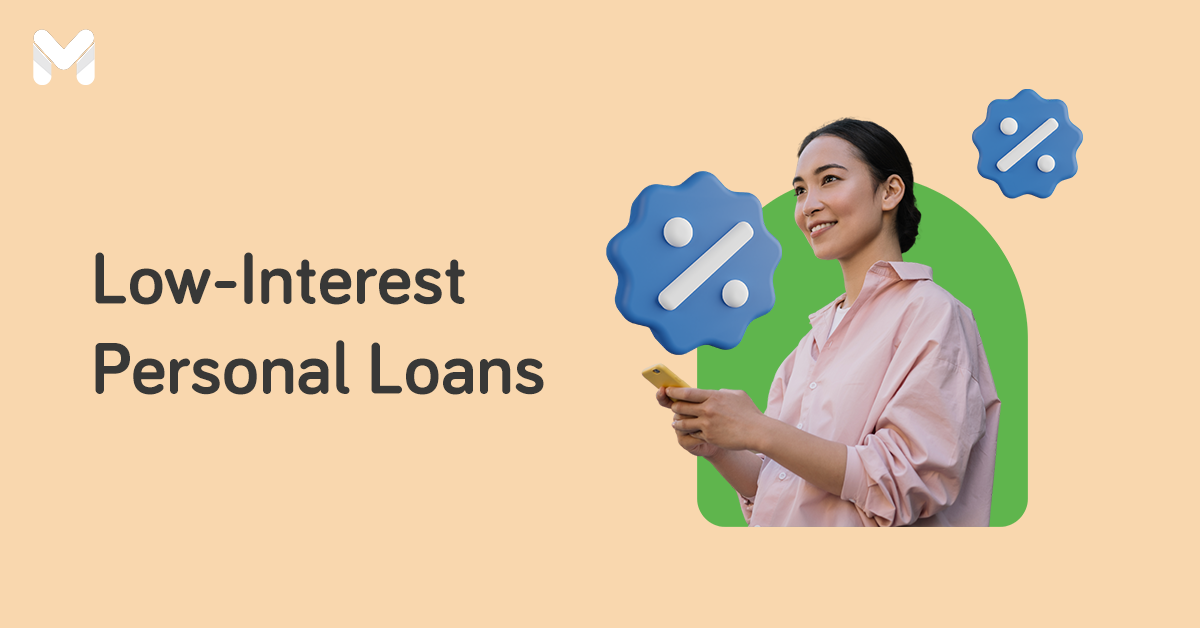Personal loans are one of the first options Filipinos consider when caught in an emergency financial situation. However, some potential borrowers are wary of difficulties with paying back their loans down the line.
This leads us to these questions: Is getting a personal loan worth it? Is it bad to get a personal loan?
Personal loans can help you with your financial problems. However, they can also be quite damaging when used for the wrong reasons. In this article, we’ll give you advice on personal loans and help you decide if getting one is worth it.
Is Getting a Personal Loan Worth It? Advantages of a Personal Loan

Personal loans can come in handy, especially when your funds start running low. Here are some benefits of getting one:
- Qualify even with bad credit - Certain types of lenders, like those providing online loans or fast cash loans, cater to borrowers with no credit history or bad credit scores. These lenders don't conduct credit checks or investigations. Instead, they require only proof of identity and a stable income.
- Qualify for personal loans even without a bank account - Not all lenders in the Philippines require a bank account for personal loan applications. Those that offer online loans, payday loans, or fast cash loans lend to borrowers without bank accounts.
- Lower interest rates than credit cards - Monthly interest rates on personal loans from banks can go as low as 1.20% to 2%, lower than the typical credit card interest rate of 3%. Meanwhile, government agencies offer loan interest rates as low as 10% per annum.
- High loan amounts - Depending on the lender, you can borrow anywhere between ₱10,000 and ₱3 million.
- Flexible repayment periods - If you choose a longer period, you can enjoy lower monthly repayments. But note you'll be charged a higher interest rate.
- No collateral - Unsecured personal loans don't require you to surrender your car or house just to borrow money. Because no collateral is required, you won’t lose any of your assets.
- Quick approvals and funding - Before, the standard loan processing time took between five to seven business days. However, many lenders now approve personal loans within minutes (for online lenders) or 24 hours (for banks). As long as you submit complete requirements and meet the eligibility criteria, you can easily get your loan proceeds in as fast as 24 hours.
- Lump sum - You can easily make a big purchase or pay off a significant debt because you get the personal loan proceeds all at once. It's also easier to manage your loan if you receive a lump sum.
- Multi-purpose - Unlike car loans and home loans that are exclusively for car and house purchases, personal loans can be used to fund different expenses.
- Build credit - Your loan repayments build credit history. Moreover, on-time loan repayments are recorded on your credit report and boost your credit score.
Disadvantages of a Personal Loan
-Feb-15-2024-01-39-32-2533-AM.png?width=600&height=400&name=Pics%20for%20blog%20-%20600x400%20(1)-Feb-15-2024-01-39-32-2533-AM.png)
Before you talk to a loan officer, it's important to know the cons of a personal loan. Here are some of them:
- Stricter requirements - Financial institutions set eligibility criteria and require documents that certain types of borrowers might not be able to meet or provide.
- Higher interest rates - This is true if you have bad or poor credit. Because lenders see this as a high risk, you may get higher interest rates for your loan. Many quick and easy loan providers also charge higher interest. Fortunately, not all personal loans in the Philippines come with high interest rates.
- High fees - Should you make a late payment, prepare to pay the corresponding personal loan fees. Also, banks charge a pre-termination fee when you pay off your loan early. These fees can be a big deal if you're on a tight budget.
- Risk of incurring additional debt - If you keep on skipping or missing your repayments, the unpaid amounts might snowball into bigger debt.
- Budget constraints - Taking out a personal loan adds another item to your monthly budget. If you’re barely making ends meet, this additional debt will strain your budget even further.
- Potential damage to credit history - You’ll harm your credit score if you can’t keep up with your loan repayments, which can make it tougher for you to get approved for a car loan or home mortgage in the future.
What are Good Reasons to Borrow Money?
-Feb-15-2024-01-40-59-3865-AM.png?width=600&height=400&name=Pics%20for%20blog%20-%20600x400%20(2)-Feb-15-2024-01-40-59-3865-AM.png)
Here are a few situations where a personal loan can be a smart move:
✔️ Debt Consolidation
When you consolidate your debts, you combine all your debts in just one account. You borrow money to pay all outstanding balances you have from different lenders.
This way, you can focus on paying off one loan and just keep track of one due date. You also have peace of mind that you haven’t forgotten to pay any other debts.
Borrow money to pay off your debts if:
- The new personal loan offers low interest rates
- It pays off all your loans in a single loan account
- You can afford the monthly repayment
Loans for debt consolidation are a great option if they have lower rates and minimal fees. Check if you can afford the monthly payments first. If the repayment amount is higher, you might just end up getting another debt you won’t be able to pay.
Getting a loan for debt consolidation is a bad idea if:
- It has higher interest rates
- The loan can only pay a few outstanding debts
- It will worsen your financial situation
A personal loan is not worth it if it costs more than all your current debts combined. In essence, you’re not making things easier financially because you’re just opting for something more expensive. Also, if the personal loan can’t pay off all your existing debts, then you won’t achieve your goal of streamlining your debt payments.
Read more: Need a Financial Boost? Check Out These 19 Low-Interest Personal Loans
✔️ Home Renovation
Getting a personal loan if you just want to change the color of your bathroom tiles or expand your veranda to accommodate your plants is not reason enough. But is getting a personal loan worth it if you want to give your family an increased sense of comfort and security? Yes!
Borrowing money for a home renovation is a good idea, especially if you want to:
- Fix a safety issue
- Upgrade the function/value of your home
- Prepare it for sale
- Extend it for additional family members
- Provide comfort and convenience
See a problem in your house that needs to be fixed immediately? Since these home fixes are usually expensive, you may borrow money to fix the leaks on your ceilings or improve the ventilation in your rooms.
Personal loans for a home renovation are worth it—especially if your intentions involve safety, comfort, and convenience, and not just home aesthetic goals.
✔️ Vehicle Financing
Should you borrow money to pay for a car? That’s what car loans are for.
They typically offer lower interest rates compared to personal loans. However, people often avoid car loans because their vehicles can get repossessed once they can’t pay their monthly amortization. In addition, some borrowers may get approved for a personal loan but get declined for a car loan.
If so, then a personal loan is an option.
Just remember that most personal loans come with higher interest rates and shorter loan tenors compared to car loans, which can be paid in three to five years.
✔️ Hospitalization and Medical Needs
Paying for medical bills through personal loans is reasonable, especially if your HMO coverage is no longer sufficient, or if you don’t have an HMO to begin with. After all, your goal is to get treated and get better.
You may also consider other options like government-funded loans such as SSS and Pag-IBIG.
Just make sure to check all the personal loan features before applying. Pay close attention to their rates and terms.
What are Bad Reasons to Borrow Money?
-Feb-15-2024-01-43-19-5546-AM.png?width=600&height=400&name=Pics%20for%20blog%20-%20600x400%20(3)-Feb-15-2024-01-43-19-5546-AM.png)
You might still have lingering doubts as to whether it's bad to get a personal loan. The quick answer: not at all—only when used for the wrong reasons.
In such cases, they become a burden instead of a relief because borrowers get the money only to address unpleasant situations without thinking about the consequences. Here are a few situations when personal loans can be bad for you:
- Using personal loans to pay for basic needs - Ideally, basic needs are supposed to be covered by your monthly income. This is because they are recurring expenses. You’ll get buried in debt if you regularly try to pay them off with a personal loan.
- Getting a personal loan with no repayment plan - You’ll most likely miss out on payments. You might take out more expensive loans just to pay off your existing loan, resulting in a vicious, debt-ridden cycle.
- Getting a personal loan for investments - Not all investments guarantee returns. Investing loan proceeds can turn sour if you don’t plan for possible bigger losses, income risks (when your actual income from investments doesn't meet your projected earnings), or interest rate risks (when interest rates rise, resulting in the decline of the value of a bond or other fixed-income investment).
- Using a personal loan for unnecessary expenses - Are personal loans bad? Yes, if you use them for unnecessary items, like parties, expensive gadgets, and other stuff you can’t afford to pay for with your monthly income. There’s nothing wrong with treating yourself, but you should plan and save up for these expenses.
- Getting a personal loan without comparing loan offers - Compare at least three loans of the same type. Compute the total cost, check the interest rates and loan tenor, and read the terms and conditions carefully.
There can be major repercussions if you're not careful. Still, there are plenty of valid reasons to get a personal loan since it can be beneficial in a lot of situations, especially in emergencies.
Read more:
- How to Compare Personal Loan Rates: Know Which Loan is the Best for You
- How to Compute Loan Interest and Monthly Amortization in the Philippines
So Should I Get a Personal Loan?
-Feb-15-2024-01-44-45-3835-AM.png?width=600&height=400&name=Pics%20for%20blog%20-%20600x400%20(4)-Feb-15-2024-01-44-45-3835-AM.png)
It depends on your purpose and your financial situation. If it will increase your value or wealth over time and improve your lifestyle and financial habits, then you should get a personal loan.
Personal loans are worth it if:
- You plan to borrow money for a worthwhile purpose, such as medical emergencies or tuition payments.
- You know how to pay it back. As a borrower, your responsibility starts way before you receive the loan amount. If you already know how you’re going to spend the money, you should also know how you’re going to repay the loan.
- You’re committed to repaying your loan on time. Most personal loans turn bad because borrowers fail to pay on their due dates. Negligence can lead to penalties.
- You plan to borrow just what you need. It’s best to avoid spending the excess amount of a personal loan on unnecessary stuff.
Final Thoughts
Is getting a personal loan worth it? Only you would know. Discerning the difference between good and bad debt[1] will help you determine if getting a personal loan is worth it, allowing you to take advantage of the benefits.
Make sure to compare personal loan interest rates in the Philippines that will best help you manage your finances and get you out of bad financial situations. Compare your options and apply via Moneymax:
|
Provider
|
Loan Amount
|
Monthly Add-on Rate
|
Loan Term
|
Minimum Annual Income
|
Approval Time
|
|---|---|---|---|---|---|
|
UnionBank Personal Loan
|
Up to ₱2 million
|
26.9% per annum
|
12 to 60 months
|
₱250,000
|
As fast as 5 minutes
|
|
UNO Digital Bank Personal Loan
.png?width=149&height=52&name=Unobank-Logo-Colored_Horizontal-Medium%20(for%20MMX).png) |
₱10,000 to ₱500,000
|
1.79% per month (corresponds to annual contractual rates or annual percentage rates ranging from 35.78% to 37.54%)
|
Six to 36 months
|
₱240,000
|
Five to seven banking days
|
|
Metrobank Personal Loan
|
₱20,000 to ₱2 million
|
1.25% to 1.75%
|
36 months
|
₱350,000
|
Seven banking days
|
|
BPI Personal Loan
 |
₱20,000 to ₱3 million
|
Maximum annual contractual rate of 28.67%
|
12 to 36 months
|
Inquire with BPI
|
Five to seven banking days
|
|
Tonik Credit Builder
 |
₱5,000 to ₱20,000
|
4.84%
|
Six to 12 months
|
Inquire with Tonik
|
Two banking days
|
|
Tala

|
₱1,000 to ₱25,000
|
0.43% daily
|
Up to 61 days
|
None
|
Five minutes to 24 hours
|
|
HSBC Personal Loan
|
₱30,000 to ₱500,000
|
0.65%
|
Six to 36 months
|
₱168,000
|
Five to seven banking days
|
|
CIMB Personal Loan
|
₱30,000 to ₱1 million
|
As low as 0.83%
|
12 to 60 months
|
₱180,000
|
One to two banking days
|
|
Maybank Personal Loan
|
Up to ₱1 million
|
1.3%
|
Up to 36 months
|
₱300,000
|
Inquire with Maybank
|
|
RCBC Bank Personal Loan
 |
₱50,000 to ₱1 million
|
1.3%
|
Six to 36 months
|
₱360,000
|
5 to 7 banking days
|
|
PSBank Personal Loan
 |
₱20,000 to ₱250,000
|
|
24 or 36 months
|
₱180,000
|
Five to nine banking days
|
Source: [1] Learn the difference between bad debt and good debt (Investopedia, 2023)







_1200x350.png?width=751&height=219&name=UB_PL_Generic_2_(Jan_2025)_1200x350.png)
_1200x350_CTA.png?width=1200&height=350&name=UB_PL_Generic_Ad_-_Home_Improvement_(Sep_2023)_1200x350_CTA.png)
-png-1.png?width=751&height=219&name=image%20(30)-png-1.png)


